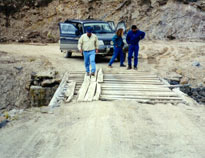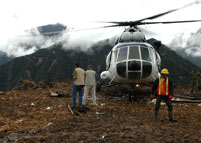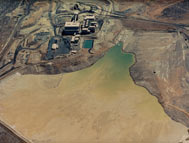Construction Claims Due Diligence
PRECONSTRUCTION SERVICES
 The eventual success of a project is almost always determined in the evaluation and planning stages. Opportunities for cost savings and risk reduction are the greatest during the prefeasibility and feasibility phases, but decrease as the project moves toward completion. Many projects fail to meet expectations because of inadequate planning, which may result in excessive changes, inadequate resources, and funding shortfalls during construction. MTB's Preconstruction Services are designed to help owners, developers, and lenders identify and mitigate potential problems, by applying the most detailed planning at the earliest time possible.
The eventual success of a project is almost always determined in the evaluation and planning stages. Opportunities for cost savings and risk reduction are the greatest during the prefeasibility and feasibility phases, but decrease as the project moves toward completion. Many projects fail to meet expectations because of inadequate planning, which may result in excessive changes, inadequate resources, and funding shortfalls during construction. MTB's Preconstruction Services are designed to help owners, developers, and lenders identify and mitigate potential problems, by applying the most detailed planning at the earliest time possible.
Conceptual Studies
Conceptual studies are the very important first step in the project development cycle. In completing conceptual studies, MTB:
- Converts a project idea to a project description containing as much detail as possible;
- Creates a project development timeline;
- Prepares order-of-magnitude capital and operating cost estimates;
- Conducts a preliminary economic evaluation of the potential project to determine if it makes sense to proceed to the next phase of development;
- Develops the scope of work, estimated cost, and schedule for the prefeasibility study; and
- Outlines issues and options to be evaluated in the prefeasibility study.
Local Conditions Assessments
 Understanding local conditions is critical to anticipating and preventing problems and to correctly identifying cost, time, and resources necessary for successful completion of a project. Local conditions assessments include consideration of the following factors when applicable:
Understanding local conditions is critical to anticipating and preventing problems and to correctly identifying cost, time, and resources necessary for successful completion of a project. Local conditions assessments include consideration of the following factors when applicable:
- Local business practices;
- Labor capabilities and productivity factors;
- Availability and reliability of local goods and services;
- Cultural issues;
- Community relations;
- Financial factors such as banking procedures, currency exchange and stability, and taxes;
- Government relations, including permit requirements;
- Health, safety, and security; and
- Logistics and transportation.
Site Selection Studies
 Subtle differences in site conditions can seriously affect the operation, life, cost, environmental performance, or reclamation of a project. Once a site has been selected, it can be difficult and costly, if not impossible, to overcome undesirable features. Depending on the specific project and site(s) being considered, MTB's site selection studies might include comparative evaluations of:
Subtle differences in site conditions can seriously affect the operation, life, cost, environmental performance, or reclamation of a project. Once a site has been selected, it can be difficult and costly, if not impossible, to overcome undesirable features. Depending on the specific project and site(s) being considered, MTB's site selection studies might include comparative evaluations of:
- Geological, geotechnical, or hydrological conditions;
- Climatological conditions;
- Proximity and adequacy of utility services, such as power, water, and gas;
- Site preparation level of effort and cost;
- Access for labor and materials during both construction and operation;
- Proximity and adequacy of product and/or waste storage or distribution facilities;
- Availability and adequacy of construction materials, such as sand, gravel, and concrete; and
- Location of potentially affected population centers or residents.
Prefeasibility Studies
By virtue of the level of effort involved, prefeasibility studies offer the first major opportunity in the project development cycle to dramatically reduce project risk while expending relatively small sums of money. In completing prefeasibility studies, MTB manages the work of specialty consultants or contractors, if needed, and coordinates its own work with the contribution of the owner/developer to produce a study that:
- Identifies site-specific issues;
- Examines the project for fatal flaws;
- Provides the project definition needed to initiate long-lead activities such as environmental baseline studies, permitting, land acquisition, community relations, financing and government agreements;
- Estimates project capital and operating costs to a typical accuracy level of ±30 percent or better;
- Presents a preliminary cash flow and economic evaluation of the project; and
- Determines the scope of work and estimated cost to complete the next project development phase: the feasibility study.
Feasibility Study Management
Properly and objectively completing a feasibility study is extremely important. The feasibility study:
- Provides the basis for a critical decision by the owners, developers, and regulatory agencies regarding whether or not to proceed with the project;
- Serves as the basis for securing project financing;
- Establishes the scope, schedule, budget, and execution plan for the project; and
- Offers the final opportunity in the project development cycle to dramatically reduce risks and make substantial changes at relatively low costs without adversely impacting the project development timeline.
In providing feasibility study management, MTB employs its objectivity, attention to detail, familiarity with the owner's perspective, and knowledge and experience across the full project development cycle. In conjunction with the owner/developer, MTB selects and manages contractors or specialty consultants required to complete the study to achieve the following objectives:
- Define the scope of the project;
- Estimate the project cost, typically to an accuracy level of ± 15 percent;
- Develop the execution plan and project schedule;
- Compete a risk assessment;
- Estimate the revenue stream;
- Determine the overall economic viability of the project and enhance project economics by evaluating different concepts and cost options;
- Provide final details for permitting;
- Provide information for obtaining project financing;
- Develop the organization and staffing requirements for the operating company; and
- Provide information for government and community relations.
Independent Study Reviews
While conducting Independent study reviews, usually on an owner's or lender's behalf, MTB will review conceptual, prefeasibility or feasibility studies prepared by third parties to ensure the following:
- Soundness of the project execution plan and project schedule;
- Recognition of local conditions or other factors that could impact project performance;
- Accuracy of the cost estimates and the economic evaluation;
- Identification of issues or options to be addressed during the next phase of development;
- Consideration of optional concepts or methods to optimize project cost and schedule performance; and
- Validity of the study's conclusions and recommendations.
Permitting Oversight and Coordination
 Permitting often requires contributions by multiple contractors or specialty consultants, as well as the owner/developer. In providing permitting oversight and coordination, MTB:
Permitting often requires contributions by multiple contractors or specialty consultants, as well as the owner/developer. In providing permitting oversight and coordination, MTB:
- Identifies all permit activities required;
- Establishes realistic durations for permit activities;
- Optimizes sequencing of activities and integrates permitting activities into the project master schedule;
- Assists the owner/developer with identifying and managing third-party resources to complete the necessary activities;
- Monitors progress, quickly identifies problems, and, where possible, develops a "work-around" to minimize adverse impacts to the project schedule;
- Reviews draft documents to verify completeness/correctness and the absence of sensitive wording or issues; and
- Assists the owner/developer with responses to questions posed by regulatory bodies.


